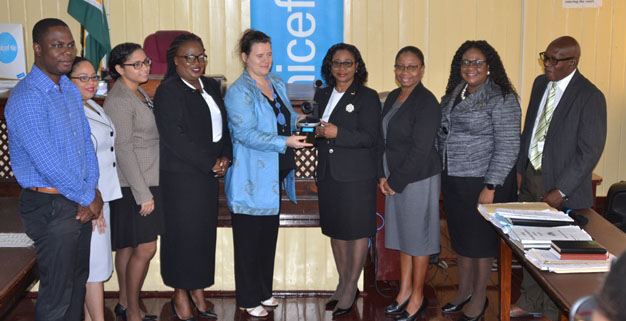The judiciary in partnership with the United Nations Children’s Fund (UNICEF) has embarked on a programme to facilitate remote court participation which will see specialised areas being set up at hospitals, police stations and the prisons, to allow witnesses to testify without having to visit the courts.
Through the Partner-ships for Access to Justice Programme, survivors of domestic violence and victims of Trafficking in Persons will be allowed to provide evidence during trials without having to be present in a court room and possibly face their abuser.
On this note, the judiciary and UNICEF yesterday commissioned and presented the necessary audio-visual recording equipment to the Vigilance Magistrate’s Court. The equipment carries a cost of $1.5 million.
“This is intended to contribute to the wider plan of ensuring easier and faster access to justice by saving time and costs, improving efficiencies and security (for instance, that may be incurred by prisoners) and improve efficiencies in the system,” the judiciary said in a statement.
The judiciary has also received commitments from the key players in the sectors, such as the hospital, to review their own procedures and to provide a safe space to ensure access to justice for families and children.
Meanwhile, Sylvia Fouet, UNICEF Country Representative for Guyana explained that with this programme they are seeking to improve the delivery of justice.
“It helps in transforming the way you [have] access to justice and you may for example have sensitive cases [with] victims of domestic abuse that are afraid to come to court and the witness can share their story from the hospital saving time and reducing cost,” she explained.
Fouet added that the Diamond Diagnostic Centre has already been equipped with the tools and a specialised area for this programme.
“We are partnering with police stations and hospitals for domestic violence cases and we are reducing time and because that is where victims are in most cases,” the country representative said. She further explained that once persons have access to the internet and a form of video-calling software they can testify in court. She was however, quick to point out that this would only be allowed in special cases.
“In terms of trafficking of persons or any other sensitive matter and there is lawyer, then that person can use for instance, WhatsApp, but they have to ensure they have the right person,” Fouet added.
Fouet highlighted that the idea is to enlarge and implement a further rolling out of the programme across the country in the coming months. She said that Region Four is ahead of the game and hopes that within a short time that other regions will be brought up to date.
Chancellor of the Judi-ciary Yonette Cummings-Edwards, in brief remarks, said they are on a transformative journey to dispense justice.
According to Justice Cummings-Edwards, technology has changed the way in which law is being practiced and they are on the path to adopting it for the administration of justice.
“We have so many young members of the judiciary who are technology efficient and it is only fitting that we get with the programme and we too [can] be technology efficient and advance as well… We have virtual court rooms but we are not going there yet [as] we want to see our magistrates and judges, but what we would like to have, is the means in which we can make justice more efficient,” Justice Cummings-Edwards said.
She stated that with the Skype system and facilities being available, magistrates and judges will be able to take evidence from persons from different locations and proceed with the hearing. The Chancellor also pointed out that the facility should result in a reduction of dismissal of cases that are due to witnesses being absent.
“This system will help us to take evidence even if witnesses are abroad or if they might be in hospitals, even the police might be in another location, they might be in the interior and you know that because Guyana is so huge, witnesses and investigators might be in different part of the country dealing with another matter in another court, and sometimes the time it takes to get to that court may result in the matter being dismissed…and so, initiatives like these will definitely help us,” she explained.
“Initiatives like these would help us to deliver judgment in (a) faster and efficient manner and it is for this reason we are partnering with UNICEF and here in this journey,” Justice Cummings- Edward added.
In addition, it was pointed out that one of the major challenges faced with using the audio-visual recording system is the quality of internet service being provided. In some instances, Justice Cummings-Edwards said they have experienced interruptions due to the poor quality of service.
